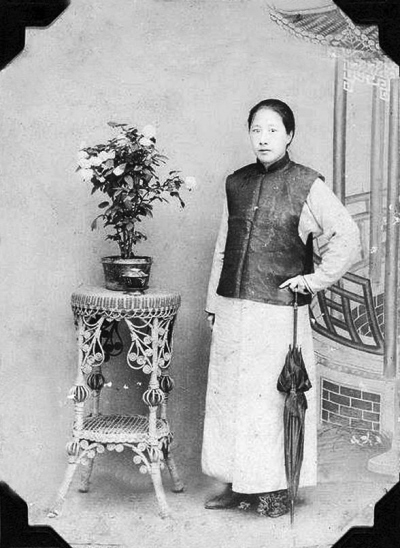A pioneering feminist in China during the late Qing dynasty, Qiu Jin has changed the attitudes of many in China towards gender roles and the social hierarchy. Born in Xiamen in 1875 to a moderately wealthy family in Zhejiang, Qiu Jin learnt and excelled in poetry, horseriding and martial arts at an early age.
In 1894, through an arranged marriage by her father, she was married to Wang Ting-jun, son of an influential, wealthy official, with whom she had two children. However, Qiu was not happy in her marriage. Wang indulged in frivolous pastimes and could not understand Qiu’s ‘restlessness’, and was frustrated by her insistence to promote feminism and reforms, something he called the affair’s of men.’ Qiu was so disappointed in him that she once sought a divorce although she couldn’t because there was no such thing in China back then.
In 1904, Qiu decided to leave her family behind to go to Japan to study, much to the dismay of her husband. In Tokyo, she studied Japanese at a school for Chinese students. She also went to student meetings and gave lectures on feminism and revolution. Together with Chen Xifun, she set up a feminist group to call for more rights to women, an almost unheard-of idea in her country. She started to cross-dress and to wear men’s clothes, and trousers.
To promote democracy, she also pioneered a publication called Bai Hua Wen (Vernacular Text), a journal that called for an end to feudalism and gender equality, including the right to education for women. One of her most influential articles calling for the abolition of bound feet rituals for women, was published in this journal. When she returned to China, she took part in the revolutionary association, Guangfuhui, led by Cai Yuanpei.
Preoccupation (Written While in Japan)
Sun and moon have no light left, earth is dark;
Our women’s world is sunk so deep, who can help us?
Jewelry sold to pay this trip across the seas,
Cut off from my family I leave my native land.
Unbinding my feet I clean out a thousand years of poison,
With heated heart arouse all women’s spirits.
Alas, this delicate kerchief here
Is half stained with blood, and half with tears.
Qiu Jin
During her studies in Japan, Qiu’s poetry also gained attention. One of her most celebrated poems, ‘Man Jiang Hong’, articulates her bold vision that women are equal to men in their personal and political ambitions: ‘Although I was not born a man, / my will is, however, much stronger than theirs!’
Crimson Flooding into the River
Just a short stay at the Capital
But it is already the mid autumn festival
Chrysanthemums infect the landscape
Autumn is making its mark
The infernal isolation has become unbearable here
All eight years of it make me long for my home
It is the bitter guile of them forcing us women into femininity
We cannot win!
Despite our ability, men hold the highest rank
But while our hearts are pure, those of men are rank
My insides are afire in anger at such an outrage
How could vile men claim to know who I am?
Heroism is borne out of this kind of torment
To think that so putrid a society can provide no camaraderie
Brings me to tears!
Qiu Jin
Translation by Michael A. Mikita, III
As a result of her efforts, the first feminist journal, Zhongguo Nu Bao (Chinese Women’s News), was published in China in 1907, four years before the first republic. The paper was full of revolutionary and feminist ideas. Qiu Jin saw the traditional family structure as oppresive to women. She fought for a modernised China, one in which women could fully participate as citizens.
Datong school in Shaoxing, Zhejiang Province, had Qiu appointed as its head in 1907. Supposedly for sport teachers, the school actually used for the military training of revolutionaries. In the same year, on July 13th, Qiu was arrested after the Uprising of Anyi, she had been working with her cousin Xu Xilin to organise and train fellow revolutionaries. They believed that China needed a democratic government. On July 6, 1907, Xu was caught and tortured for information prior to the uprising they had scheduled in Anqing in Anhui Province. He was executed the next day.
A few days afterwards Qiu Jin learned about her cousin’s death and the failed uprising. Despite being warned that officials would be coming for her at the Datong school, she stayed anyway, writing to her sword sister Xu Yunhua that she was determined to die for the cause. On July 13, Qiu was arrested. Even after being tortured she refused to talk about her involvement in the scheduled uprising, but incriminating evidence was found at the school.
On July 15, 1907, Qiu Jin was beheaded publicly in her home village of Shanyin, at the age of 31.
Today she is an honoured as a national hero in China.
Jennifer Wong
Capping Rhymes With Sir Shih Ching From Sun’s Root Land
Don’t tell me women
are not the stuff of heroes,
I alone rode over the East Sea’s
winds for ten thousand leagues.
My poetic thoughts ever expand,
like a sail between ocean and heaven.
I dreamed of your three islands,
all gems, all dazzling with moonlight.
I grieve to think of the bronze camels,
guardians of China, lost in thorns.
Ashamed, I have done nothing;
not one victory to my name.
I simply make my war horse sweat.
Grieving over my native land
hurts my heart. So tell me;
how can I spend these days here?
A guest enjoying your spring winds?
Qiu Jin
Translation by Michael A. Mikita, III


Pingback: autumn: a poem for Qiu Jin, Chinese poet, feminist, revolutionary, & martyr – ctharsis
Pingback: Mavens of March (6-10) | Katherine Sherbrooke
Pingback: Crimson Flooding into the River – Poets Corner
Pingback: Week 7 Blog Post – My Blog